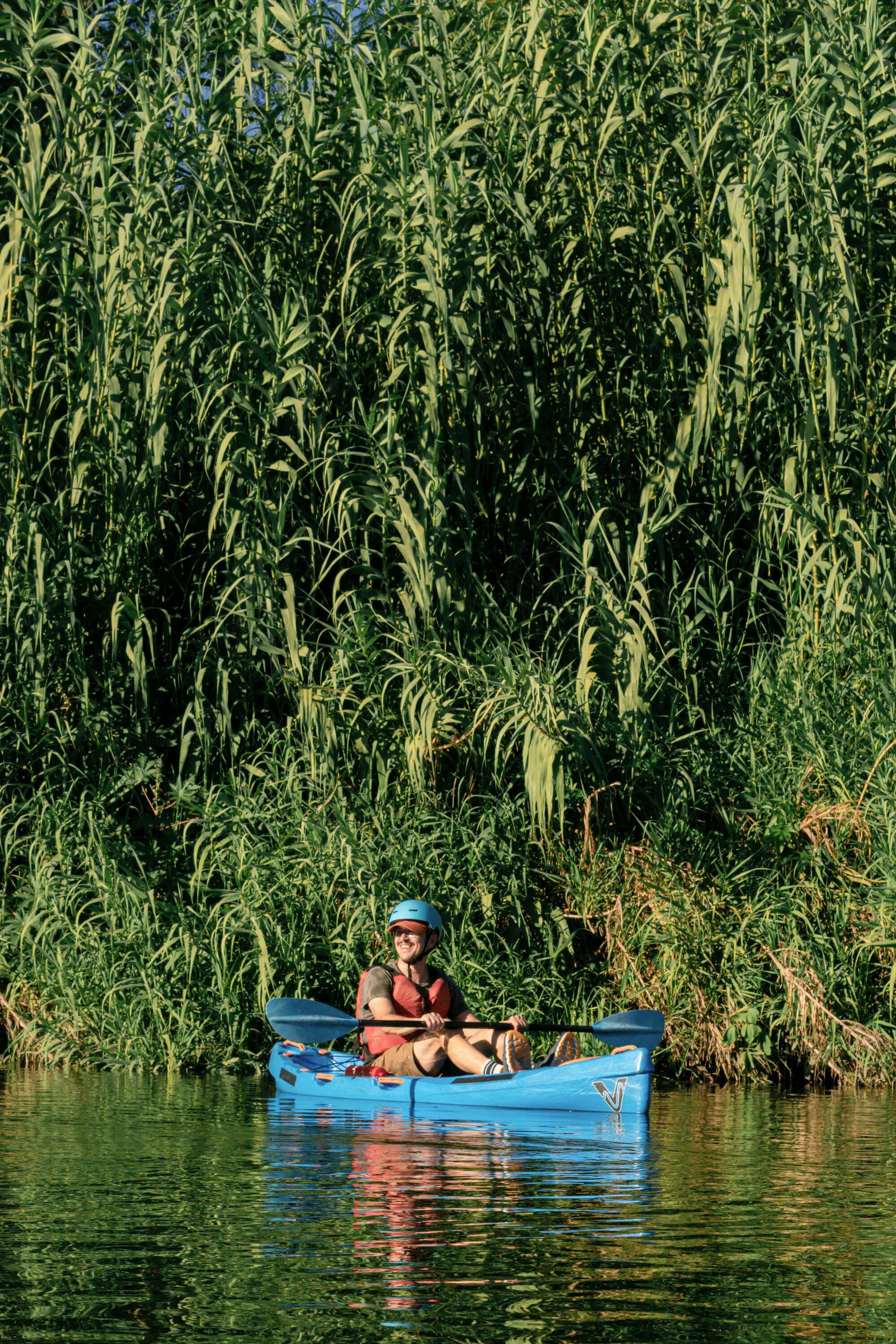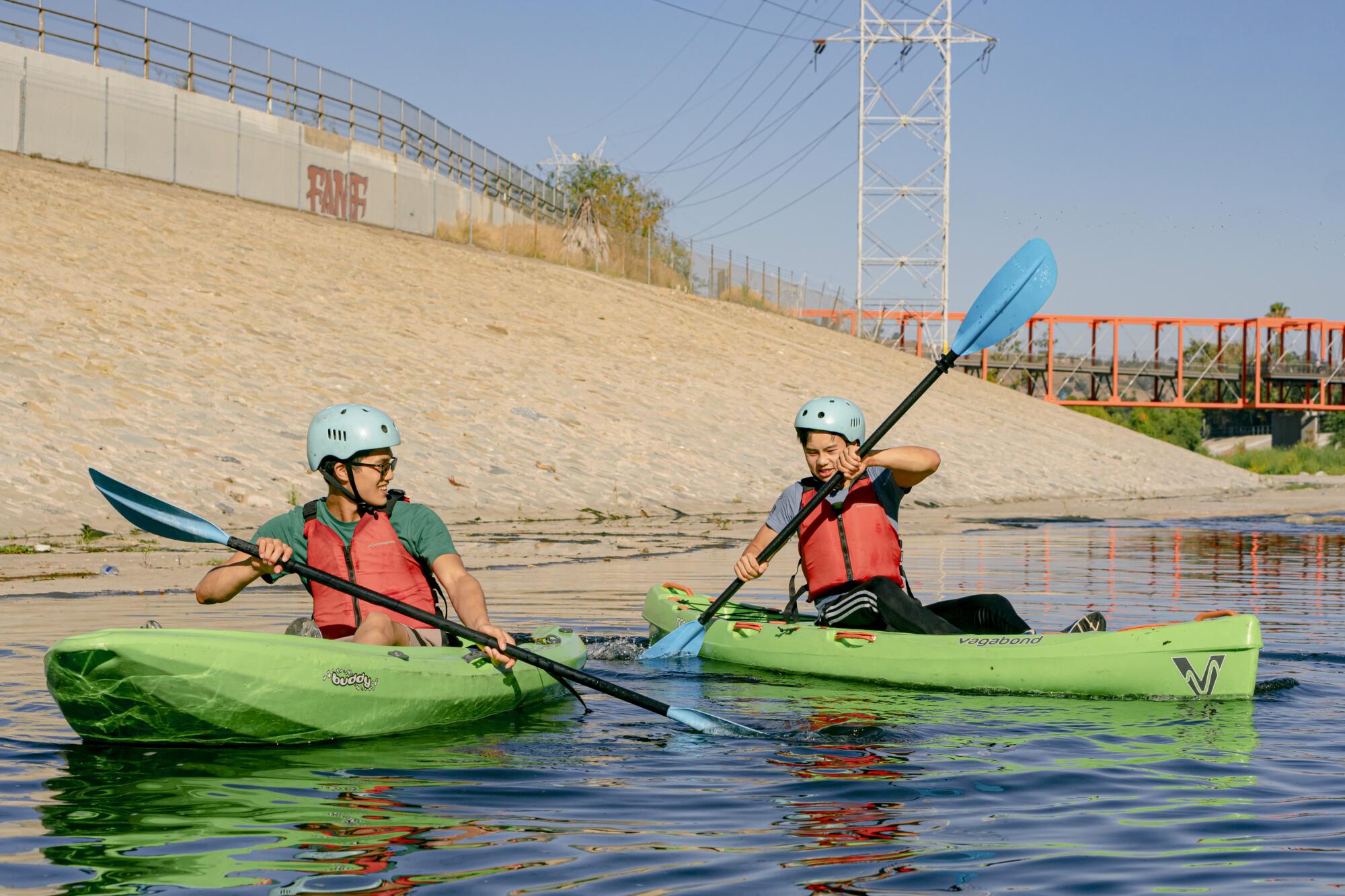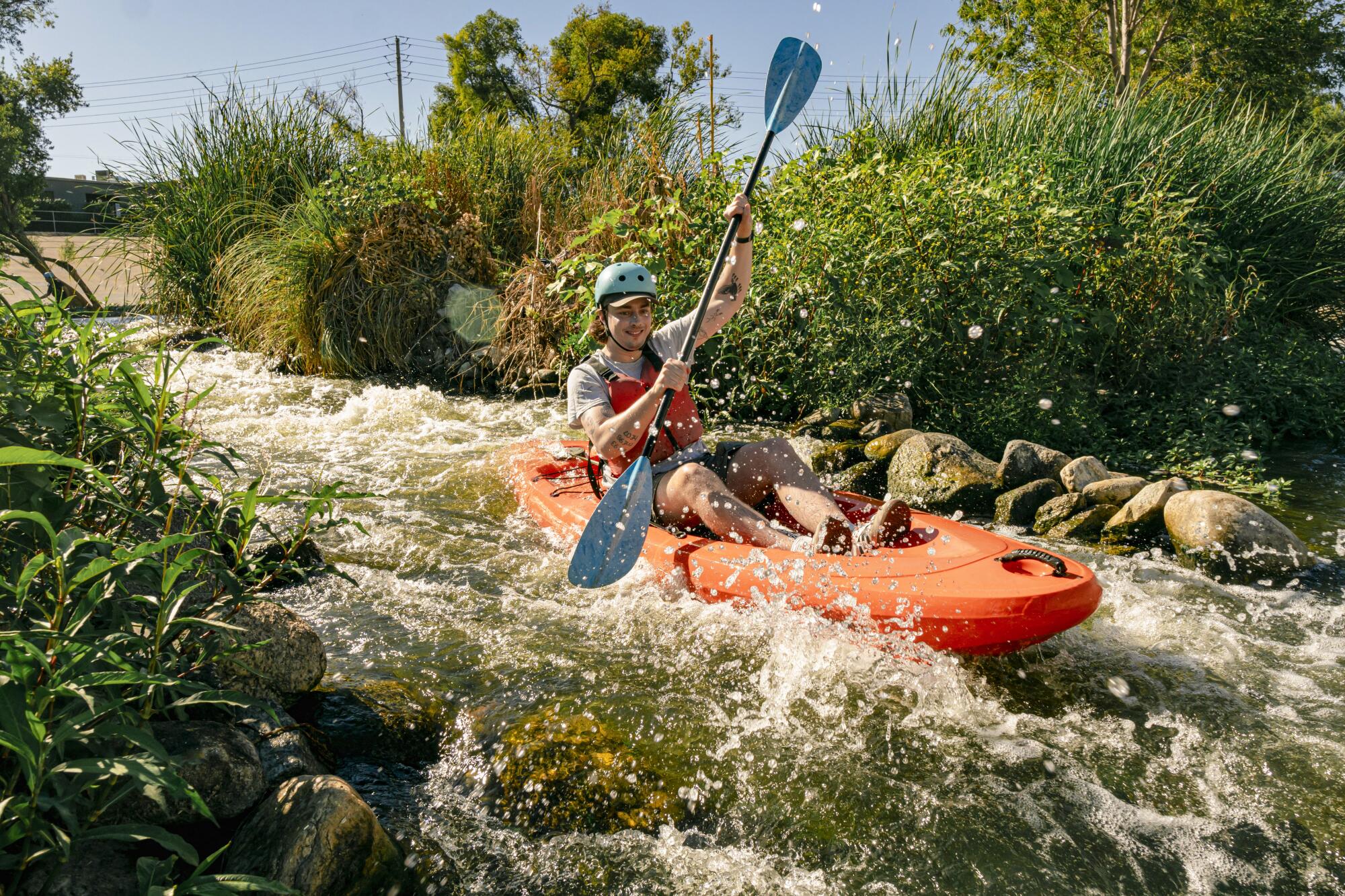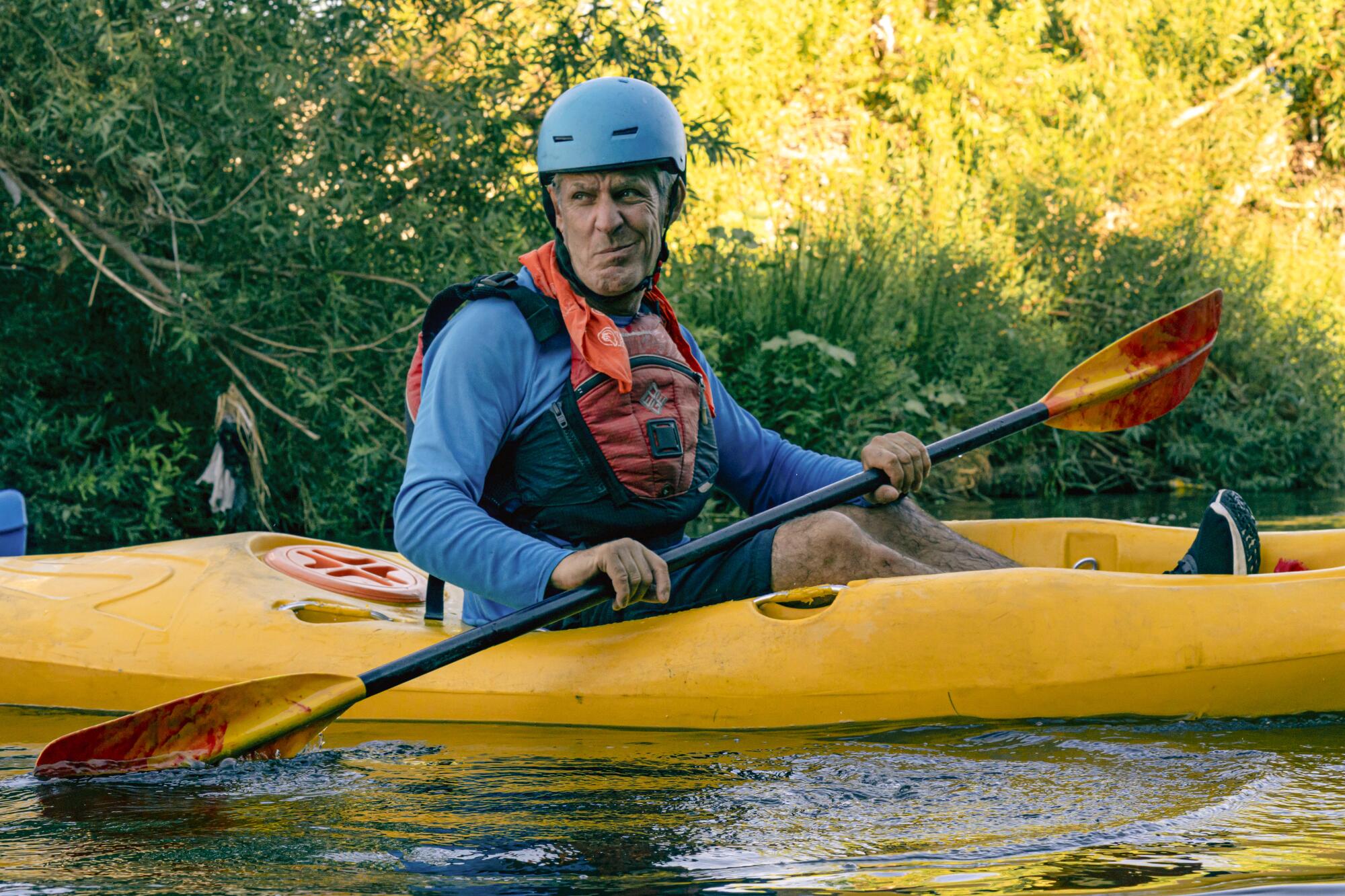- Share via
The Los Angeles River. Some Angelenos actively avoid it. Others deny its very existence. But it’s there. And it’s beautiful. I recommend experiencing it on a kayak.
“Look at those black-necked stilts!” said our guide Steve Appleton, owner of L.A. River Kayak Safari, pointing to a flock of the delicate shorebirds gliding just inches above the water surface. Sitting in my red kayak, I was too busy trying to navigate the next rapid, a narrow water trail that shot through a dense grove of cattails.
“Sweep right!” Appleton instructed.
At last, the water calmed. As I looked around, I noticed local avians scurrying along the banks. Appleton explained that the lush canopy of plants above them were native sandbar willows, which have a tremendous impact on the habitat.

You might not think of the Los Angeles River as a rip-roaring kayaking destination — after all, the channel is surrounded by buildings, train tracks and graffiti-lined walls — but you’d likely be surprised. My recent excursion was a remarkable respite from the hustle of the city and a prime learning opportunity about the importance of conservation. And it was one helluva ride.
“The L.A. River is a way to tell the story of the history of Los Angeles and to speculate about its future,” said Appleton, who is also deeply involved in the river’s restoration and revitalization (and actually owns 4.5 acres of it). “The part I most enjoy is the intimacy that results from kayaking together in this unlikely space of nature found in the middle of the city.”
Interested in trying this educational escapade? Here are some answers to questions you might have.
Wait, you can kayak on the L.A. River?
You can. Once an important water and food source for the Tongva, the original people of Los Angeles, the L.A. River was formerly free-flowing but got a makeover as a concrete channel after a devastating 1938 flood. For many years, it was deemed too dry to even be considered a river, but in 2010, the Environmental Protection Agency declared it a “traditional, navigable waterway.” The first official kayak tours happened in 2011, led by the Los Angeles Conservation Corps. This summer, the river will be open for kayaking, fishing and other activities through Sept. 30.
OK, I’m intrigued. Where exactly would I kayak?
Of the river’s nearly 51-mile stretch from the San Fernando Valley to Long Beach, two sections can be navigated by kayak during the summer: a two-mile stretch in the Sepulveda Basin and a 2½-mile passage through Elysian Valley, both managed by the Mountains Recreation and Conservation Authority since 2014. I opted for an urban adventure through Frogtown, though the Sepulveda Basin section is also worth exploring and tends to be gentler, with a less urban feel.

Who will guide me?
As recognized by the MRCA (which often hosts its own special trips), there are three official kayaking outfitters for the L.A. River:
L.A. River Kayak Safari: This organization guides two trips through the Elysian Valley stretch on weekends and one on Fridays. It also takes organized groups out to the river on Tuesdays and Thursdays (L.A. organizations Native Ways 2 College and Hike Clerb recently went on excursions). The tours, which start and end at Oso Park, cost $85 per person for a 2½-hour experience that includes a bike ride, history and environment talk, training and plenty of time on the water.
L.A. River Expeditions: Founded by George Wolfe after he led a three-day journey down the entire river in 2008 (which contributed to the EPA protecting the “navigable” river), L.A. River Expeditions currently offers tours through both Elysian Valley and Sepulveda Basin with experienced guides. Sepulveda Basin excursions, which navigate gentler waters, are $50 per person and take place at 9 a.m., 12:30 and 3:30 p.m. on weekends. Elysian Valley tours are $75 per person and happen on select Saturdays at 11 a.m. and 2 p.m. You can also organize a private tour by contacting the team directly.
L.A. River Kayaks: Looking to go solo? L.A. River Kayaks rents equipment to kayakers comfortable with exploring the river on their own, via dropoff and pickup points. There are two options: standard, a 1.1-mile trip ($37.50), and experienced, which covers of 2½ miles ($57.50). Jeffrey Tipton, who runs the company, started the service after filming Wolfe 15 years ago prior to their infamous 51-mile journey.
I don’t have kayaking experience — will I be able to do it? What should I bring?
While it’s recommended to be in good physical shape for any river romp, paddlers of all levels can kayak on the river. (Due to weight limits, contact your tour guide ahead of time if you are more than 230 pounds.) My experience was both thrilling and peaceful. The rapids — Appleton clocked them at Class I to II — were manageable yet surprisingly technical, as we had to navigate through rock gardens, under low-hanging trees and around bamboo groves.
Do know that you’ll probably get stuck a few times and definitely will need to get out of your boat at least once. And perhaps most obviously, you will get wet. Bring appropriate gear, dry bags for your phones and waterproof shoes (old tennis shoes work too). Most importantly, as Appleton says, “Being good-spirited is the most important criteria for your enjoyment of the trip.”

Is the water safe?
Pollution is a perennial concern for Angelenos, so residents may rightfully be wary of the river’s health. Fortunately, river safety and water quality is not only hugely important to the MRCA and the outfitters but also actively monitored. Los Angeles Sanitation and Environment staff sample and test the water twice a week and, based on bacteria levels, a color-coded status is determined: green (for good to go), yellow (proceed with caution) and red (closed to all). There are also light beacons placed throughout the zone, including next to L.A. River Kayak Safari’s launch point, to indicate current reports. You can stay updated here — it’s especially important to do so after heavy rain. Appleton was active in alerting our group when bacteria levels were potentially unsafe, and we were only allowed to get on the water when results were clear.
What will I see while kayaking?
In both kayaking regions, you will see an array of local waterfowl among classic riparian flora (notably, sycamores, cottonwoods and willows). I spotted ducks, coots and cormorants. Expect the aforementioned usuals, along with snowy egrets wading under the willows, black-necked stilts scurrying along the banks and Canada geese floating nearby. You’ll also likely spot what is the unofficial river mascot: the great blue heron, often found stalking among the invasive Arundo donax reeds. The urban birdwatcher’s paradise continues in the skies — search for winged residents like black-crowned night herons, red-winged blackbirds and even ospreys (large raptors that feed on the local carp) as you pass under bridges and around both native and invasive plants, including those most significant in conservation efforts.
What’s there to do after the tour?
So you’ve just paddled the L.A. River — it’s time to celebrate and get your land legs back. In the Elysian Valley, head over to local riverside spots like Spoke Bicycle Cafe, which not only has great food but also rents bicycles to continue your exploration, or Frogtown Brewery for a post-kayak cheers. At Sepulveda Basin, opt to further explore the recreation area surrounding the river — the picturesque Lake Balboa at Anthony C. Beilenson Park and SuihoEn, a serene Japanese garden, come to mind.
Most importantly, after reflecting on your experience, consider getting involved in advocacy for the river. On the tour, you’ll likely see an occasional plastic bag or piece of trash. This only serves as a reminder of the importance of water trail conservation. Participate in cleanups, such as those hosted every Saturday by Friends of the L.A. River, or ask your tour guide about opportunities to help during your kayak trip. “This river is a work in progress,” Appleton said, “but it’s an inspiration for what restoration can do.”

More to Read
Sign up for The Wild
We’ll help you find the best places to hike, bike and run, as well as the perfect silent spots for meditation and yoga.
You may occasionally receive promotional content from the Los Angeles Times.








